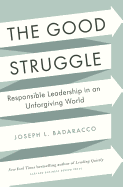Jack Covert Selects - The Good Struggle
October 15, 2013
The Good Struggle: Responsible Leadership In an Unforgiving World by Joseph L. Badaracco, Harvard Business School Press, 203 pages, $25. 00, Hardcover, October 2013, ISBN 9781422191644 Joseph Badaracco takes a particularly unnerving stance to open his new book, The Good Struggle.
The Good Struggle: Responsible Leadership In an Unforgiving World by Joseph L. Badaracco, Harvard Business School Press, 203 pages, $25.00, Hardcover, October 2013, ISBN 9781422191644
Joseph Badaracco takes a particularly unnerving stance to open his new book, The Good Struggle.
Markets, rather than religion or government or family or ideology, seem to be the most dynamic and powerful force in our world.
Badaracco was researching leadership on the small business level when he realized that there was no longer a clear separation between big business and small business, and that “the entrepreneur’s world is becoming almost everyone’s world.” The result of this change is an unending variability or chaos that makes leadership a constant struggle.
With big no longer a value in our culture, there is additional chaos because so much has been modularized. And with modularization there are less givens, more complexity, more room for varied interpretation, for good or for ill. “The natural instinct in these circumstances,” Badaracco posits, “is to take care of yourself, here and now, and follow Bertolt Brecht’s adage about bread before ethics.” And so, this book, like his previous book, the excellent Questions of Character, centers on doing the right thing during those turning points when leaders must make difficult decisions in the face of great responsibility.
Badaracco makes the case that markets are now the primary governors of accountability and form a “horizontal accountability” rather than a vertical hierarchy:
Leaders and companies make commitments in markets. If a company succeeds, markets make more resources available and give companies and their leaders more discretion. If a company fails, markets withdraw resources and put their leaders on shorter leashes.
The changing face of business has also forced leaders to handle decision-making differently. “Entrepreneurs,” he writes, “have to make decisions with scant information, little or no staff to do detailed analysis, no budget for consultants, scarce time for decisions, and little room for error.” Instead of long-term strategies and well-researched changes of course, a new type of decision-making is needed that Badaracco calls “evolving commitments” or “pledges” that takes into consideration the ever-changing small modules by remaining fluid, adjustable.
These commitments can be led by leaders asking themselves, “Do We Have the Right Core Values?” As things change so rapidly both internally and externally companies must have a pole star to set course by. And that is also what this book serves as. More people are finding themselves more responsible for more choices. If you feel lost in an ever-changing world in which you never feel comfortable or clear, read The Good Struggle for a better sense of why, how you can adapt, and how you can create a steady platform to stand on—if only for a moment.


